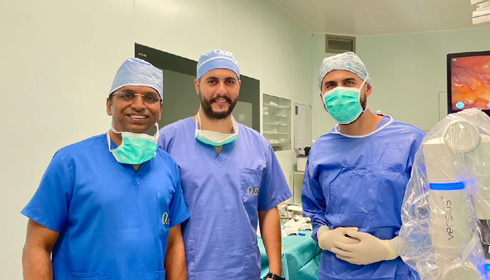
Indian Doctor Paves Way for Renewed Medical Collaborations with Middle East
Dr Raj Nagarkar, a prominent oncologist from India, was instrumental in executing Jordan's first robotic radical hysterectomies, marking a watershed moment for both countries. At the King Hussein Cancer Centre (KHCC) in Amman, Dr Nagarkar and Dr Qais Shatnawi achieved this milestone in Jordan's medical history, signifying a significant improvement in the country's healthcare skills.
In addition to marking a significant advancement in Jordan's use of advanced robotic techniques, the surgeries on two women diagnosed with endometrial cancer also highlight the potential for reviving and strengthening medical collaborations between India and Middle Eastern countries.
The effective implementation of these difficult treatments demonstrates the rising relevance of international medical collaboration in driving innovation and improving healthcare standards across regions.
Dr Nagarkar of the HCG Manavata Cancer Centre (HCGMCC) in Nashik is one of India's leading experts in robotic-assisted cancer procedures. His offer to participate in this historic operation at KHCC demonstrates the deep relationships and mutual respect between the Indian and Jordanian medical communities.
We aim to pave the way for future collaborations that aim to exchange information, skills, and sophisticated medical technology."Assisting with Jordan's first robotic radical hysterectomy at KHCC was a very inspirational experience.
Dr Nagarkar stated that these procedures' success is likely to pave the way for the adoption of sophisticated robotic methods in Jordan, particularly in cancer. He emphasised the value of collaboration and innovation in healthcare and thanked Dr. Mahmoud Al Masri and Dr. Qais Shatnawi for their visionary leadership and talent.
The successful procedures at KHCC highlight the possibility for renewed and enhanced connections between India and Middle Eastern countries, notably in healthcare.
As Jordan invests in sophisticated medical technology and works to improve its healthcare services, Indian physicians and medical institutes have a unique chance to lend their experience. This relationship may result in a greater exchange of information and technology, benefiting patients throughout the area.
Dr Mahmoud Al Masri, Chairman of the Department of Surgery at KHCC, hailed Dr Nagarkar's essential contribution, noting, "This landmark event not only enhances collaboration between the Indian and Jordanian medical communities but also sets a new benchmark for cancer care in the region."
An Indian oncologist's involvement in such a momentous medical surgery in Jordan reflects a larger trend of increased medical collaboration between India and the Middle East. With India's rising reputation as a hub for sophisticated medical treatments and technology, there is enormous potential for future cooperation to achieve substantial breakthroughs in healthcare throughout the Middle East.
The successful procedures demonstrate the strength of worldwide collaboration in pushing the frontiers of medical knowledge. As Dr. Nagarkar stated, "This is only the beginning." The flawless execution of the procedures demonstrates robots' potential to revolutionize cancer treatment on a global scale. I'm looking forward to future partnerships that push the boundaries of what we can do in medicine."
The recent success at KHCC might catalyze additional collaborative endeavours between Indian and Middle Eastern medical experts, establishing a culture of collaboration that could lead to better healthcare outcomes and innovation in the area. As both nations continue to invest in sophisticated medical technology and training, the opportunities for future collaboration are endless, offering a better future for both patients and healthcare practitioners.